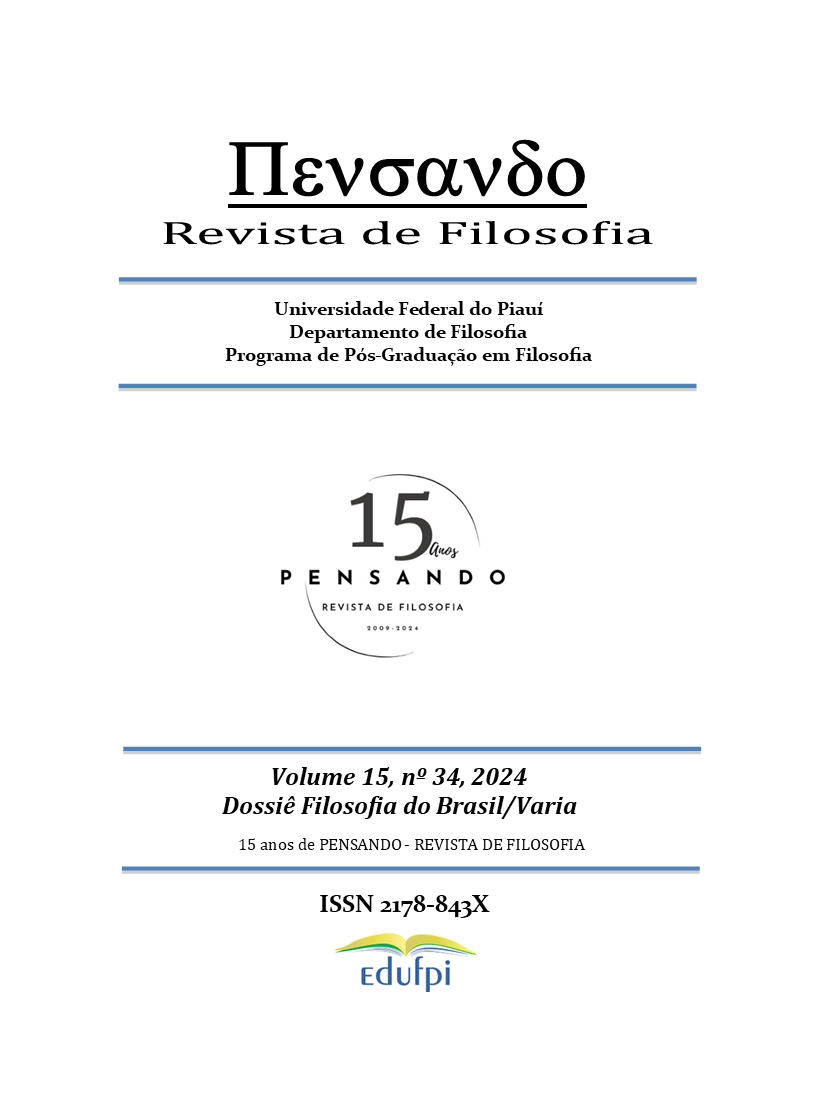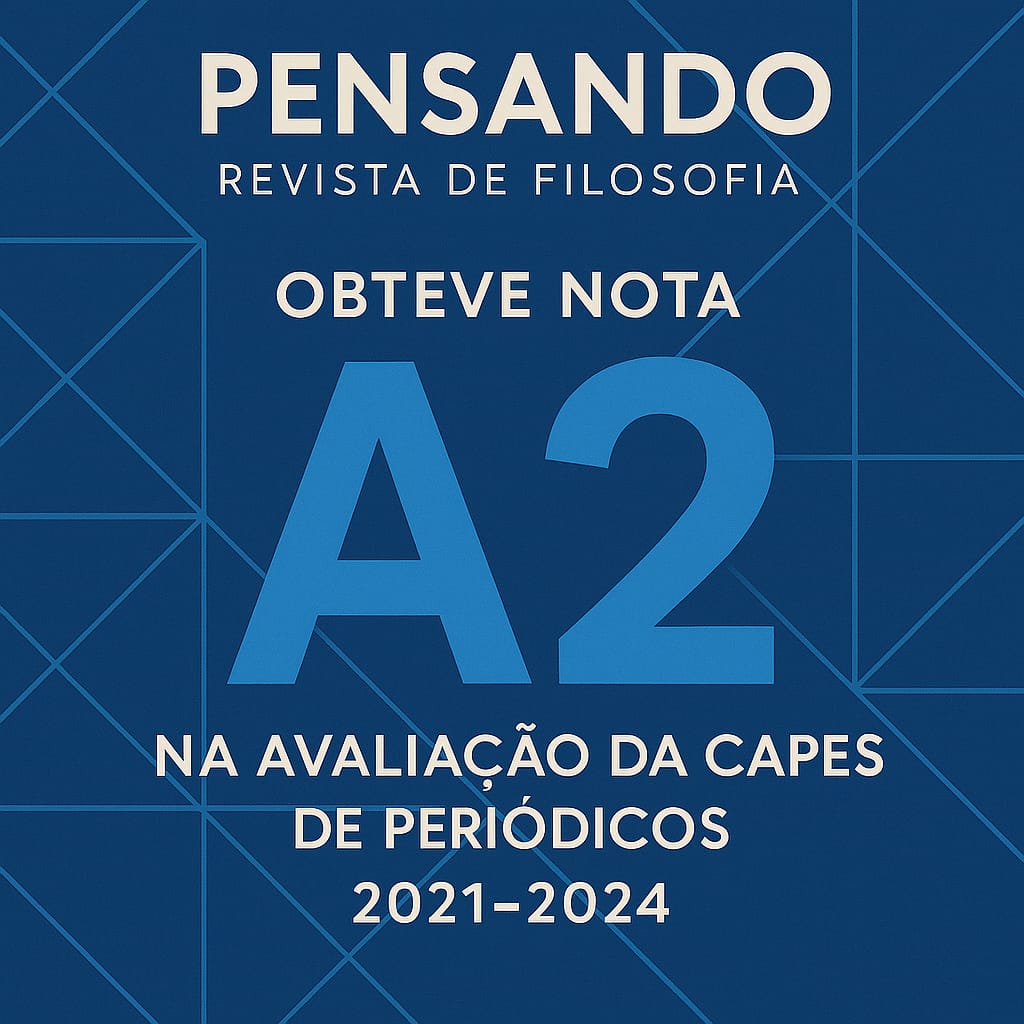Political-Social viewpoints in the Philosophical thought of Xunzi
DOI:
https://doi.org/10.26694/pensando.vol15i34.4077Resumo
Xunzi's sociopolitical views were created during the Spring and Autumn period (Sheng-Hsi, C. 1975). Xunzi’s philosophical thought was born with the aim of transforming society from chaos to prosperity by improving people's awareness. Xunzi’s views also had certain influences on the social period in which he was living with certain contributions. In this article, the author will focus on clarifying the socio-political views of Xunzi through such issues as identity point of view, views on human nature, and views on society from the perspective of history and philosophy.
Referências
Chong, K. C. (2008). Xunzi and the essentialist mode of thinking about human nature. Confucian Ethics in Retrospect and Prospect, 27, 93-102. https://doi.org/10.1111/j.1540-6253.2007.00463.x.
Cua, A. S. (2005). Human nature, ritual, and history: Studies in Xunzi and Chinese philosophy. Washington, DC: Catholic University of America Press.
Douglas J. Keenan (2002), Astro-historiographic chronologies of early China are unfounded, East Asian History, 23: 61-68.
Eno, R. (1990). The Confucian creation of heaven: Philosophy and the defense of ritual mastery. Albany: State University of New York Press.
Fung, Y.-L. e. B. D. B. (1948). A Short History of Chinese Philosophy. New York, MacMillan.
Fung, Y.L. (1952). A History of Chinese Philosophy, Vol. 1: The Period of the Philosophers (from the Beginnings to Circa 100 B. C.) Lon Don George Allen & UNWIN LTD Ruskin house Museum street. Barcode : 5990010111781
Feng, C. (2016). A new examination of Confucius’ Rectification of Names. Journal of Chinese Humanities, 2(2), 147-171.
Graham, A. C. (1978). Later Mohist logic, ethics, and science. Hong Kong: The Chinese University Press.
Guying, C. (2018). The Notion of “Ritual Propriety” in Early Daoism. In The Humanist Spirit of Daoism (pp. 61-90). Brill. https://doi.org/10.1163/9789004361980_005
Harris, E. L. (2013). The Role of Virtue in Xunzi’s 荀子 Political Philosophy. Dao, 12(1), 93-110.
Harris, E. L. (2016). Xunzi’s political philosophy. In Dao Companion to the Philosophy of Xunzi (pp. 95-138). Springer, Dordrecht.
Hansen, C. (2000). A Daoist theory of Chinese thought. New York, NY: Oxford University Press.
Hagen, K. (2002). Xunzi’s use of Zhengming: Naming as a constructive project. Asian Philosophy, 12 (1), 35–51.
Ivanhoe, P. J. (1994). Human nature and moral understanding in Xunzi. International philosophical quarterly, 34(2), 167-175. https://doi.org/10.5840/ipq19943421.
Jiyu, R. (2010). Fight Hard to Advance the Marxist Study of Religion. Contemporary Chinese Thought, 41(4), 69-87. https://doi.org/10.2753/CSP1097-1467410406
Knapp, K. N. (2010). Sato, Masayuki, The Confucian Quest for Order: The Origin and Formation of the Political Thought of Xunzi.
Kuang, X. Xunzi 荀子.
Lin, C.-I. (2011). Xunzi as a semantic inferentialist: Zhengmin, Bian-Shuo and Dao-Li. Dao: Journal of Comparative Philosophy, 10(3), 311–340. doi:10.1007/s11712-011-9228-z
Makeham, J. (1994). Name and actuality in early Chinese thought. Albany: State University of New York Press.
McLeod, A. (2018). Xunzi and Mimamsa on the Source and Ground of Ritual: An Analogical Argument.
Möller, H.-G. (2001). Chinese language philosophy and correlativism. Museum of Far Eastern Antiquities Bulletin, 73, 91–109.
Nair, R., Sellaturay, S., & Sriprasad, S. (2012). The history of ginseng in the management of erectile dysfunction in ancient China (3500-2600 BCE). Indian journal of urology: IJU: journal of the Urological Society of India, 28(1), 15. doi: 10.4103/0970-1591.94946
Perrett, R. W. (2002). Evil and human nature. The Monist, 85(2), 304-319. https://doi.org/10.5840/monist200285220.
Staal, Frits (1979). "Oriental Ideas on the Origin of Language". Journal of the American Oriental Society. 99 (1): 1–14. doi:10.2307/598944. JSTOR 598944.
Sheng-Hsi, C. (1975). the Debate between the Confucianists and the Legalists over the question of Ancient History during the spring and Autumn Period and the Warring states Period. Chinese Studies in Philosophy, 7(3), 57-77.
Tsai, C. H. (2014). Xunzi and Virtue Epistemology. Universitas, 41(3).
Wang, R. R. (2005). Dong Zhongshu's transformation of" Yin-Yang" theory and contesting of gender identity. Philosophy East and West, 209-231.
Wang, X. (2021). The Tradition of Confucianism and the Positioning of Chinese Philosophy in the Development of the New Century. Advances in Educational Technology and Psychology, 5(10), 32-38.
Yates, R. D. (2016). Searching for Peace in the Warring States: Philosophical Debates and the Management of Violence in Early China. Peace in the Ancient World: Concepts and Theories, 98-121.
Downloads
Publicado
Como Citar
Edição
Seção
Licença
Copyright (c) 2023 PENSANDO - REVISTA DE FILOSOFIA

Este trabalho está licenciado sob uma licença Creative Commons Attribution 4.0 International License.

























